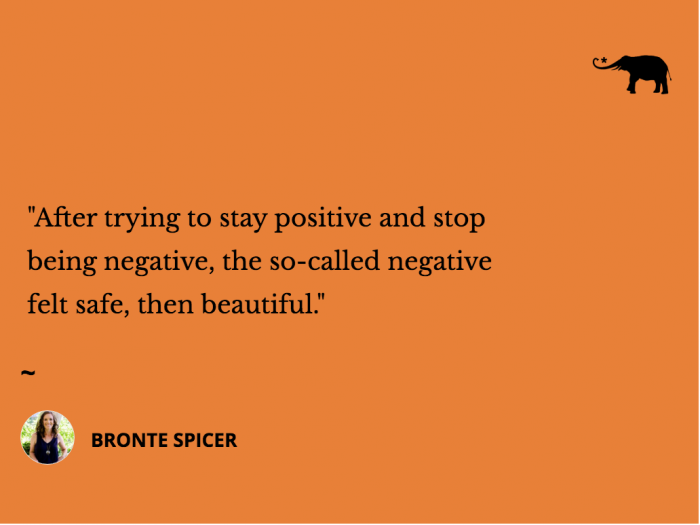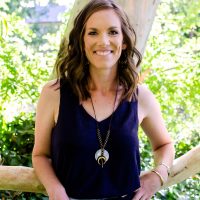View this post on Instagram
*Elephant is not your doctor or hospital. Our lawyers would say “this web site is not designed to, and should not be construed to provide medical advice, professional diagnosis, opinion or treatment to you or any other individual, and is not intended as a substitute for medical or professional care and treatment. Always consult a health professional before trying out new home therapies or changing your diet.” But we can’t afford lawyers, and you knew all that. ~ Ed.
I lived with depression from the age of 14 for 22 years.
Two years ago, my mental illness dissolved.
Even though I did all the right things, like going to therapy and taking medication, it wasn’t until I stumbled across a science-backed, body-based approach to improve mental health that my depression fell away before my eyes.
My depression felt like a big black shadow lurking in the background that would creep over my shoulder and taunt me. It was present enough for me to know it was always there. On more difficult days, it would linger and threaten to stay. I was terrified this feeling would keep returning and stay longer each time. My worst nightmare was that it would wrap its black fingers around me, pull me into its eternal darkness, and have me disappear forever.
When I had depression, I did all the right things. I saw my doctors, was given mental health plans, took antidepressants, and saw a long list of psychologists and counsellors. My psychologists showed me how to reframe my thoughts with CBT (cognitive behaviour therapy) and helped me find some clarity and resolve my past.
On my own accord, I practised basic mindfulness, breathing techniques, and meditation from as young as 16. Throughout my 20s, I journalled, flipped many negative beliefs into positive, repeated affirmations, and used spiritual rituals to ease my pain. While all of these gave me momentary relief, none of them took my depression away.
After believing I would stay on antidepressants for the rest of my whole life, two years ago, everything changed.
In March 2019, I was introduced to the Kiloby Inquiries, which is a set of advanced mindfulness or compassionate inquiry techniques that helps you release negative beliefs about yourself, process your pain from the past, and improve your mental health.
When I began working 1:1 with a Kiloby Inquiries facilitator, it was the first time I was shown how to feel safe with the debilitating feelings in my body that came with my depression. It was the first time that I learnt how to feel safe with the horrendous stories in my mind that I believed to be true about myself. And it was the first time I learnt how to feel safe with painful memories from my childhood.
The next six months saw me applying these techniques to my daily triggers, negative stories and flashbacks from the past, and my mental health gradually improved. While monitored by my doctor, I stopped taking antidepressants and relied on the techniques and my own inner resources instead. Within months, I no longer had depression.
Looking back on my 20-year bout of depression, I was dumbfounded that in all my treatment, no one had shown me how to feel.
I realised there was one pivotal piece that had been missing in my mental health treatment: learning how to safely feel my feelings.
The latest research on trauma, the brain and the nervous system points to why talking to someone isn’t always enough and a body-based or somatic approach to mental health is becoming the answer for many.
If you have dismissed the value of your emotions, you’re in good company. When others told me to connect with my feelings, I scoffed and thought, it’s not my emotions that are the problem, it’s my mind; I just need to stop these negative thoughts. I completely ignored the inherent mind-body link and thought my emotions were a waste of time.
When my mum passed away in 2008, I told myself, “What’s the point in being sad; it only makes you feel worse,” so I would distract myself from the grief and put my attention elsewhere. This helped me cope at the time but kept me stuck in depression.
I also thought if I felt my feelings, I would die. The sheer thought of going toward what felt like insurmountable pain from the past had me rooted in terror. When I had discomfort in my body, I quickly darted my attention elsewhere so as not to exacerbate the feeling. The more I thought about the feeling, the worse it felt. So I escaped, daily.
Even if I wanted to, I didn’t know how to begin to process my pain. I had a sense it was buried deep down, and while talking to professionals took the edge off, the bulk of my pain stayed lodged inside. Unknowingly, I was dissociated from my body, which kept me looping in my mental noise.
All that time I had depression and didn’t improve, I thought there was something wrong with me. It turned out, I had just been missing some simple, yet vital tools to manage the inevitable challenges of being human.
Learning the Kiloby Inquiries gave me tools to feel safe feeling my feelings. I learnt to say “thank you for arising” to the lump in my throat. I learnt how to let the heaviness in my heart feel heavier so I could experience deep rest and then watch the heaviness dissipate. When I used the tools, the feelings I once considered painful would miraculously transform into the most pleasurable, joyful, and freeing feelings.
My pain ended up being my medicine.
After running from these horrible, lurking, dark energies in my body, they were the gift I was always wanting. After trying to stay positive and stop being negative, the so-called negative felt safe, then beautiful.
If I was shown these simple tools when I was 14, my life would have looked different. If you are experiencing depression or anxiety and feel like there’s something wrong with you because you’re not improving with medication and talking to a professional, I invite you to read my book It’s Okay to Cry to see if there is a pivotal piece that’s missing in your treatment too.
Perhaps a body-based approach is the answer to your mental health too.
~












Read 4 comments and reply